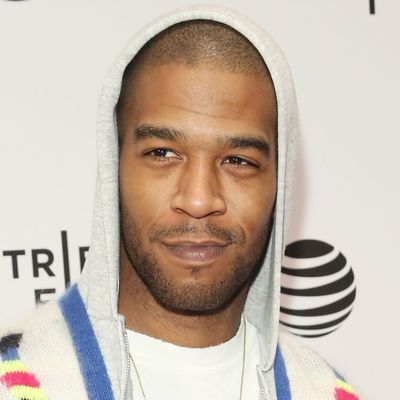
We were promised that a new album from Cleveland Kanye West protégé Kid Cudi would arrive last Friday, but a Thursday-night note from the artist quashed the release of Passion, Pain, and Demon Slayin’, citing trouble clearing samples. It wasn’t the album’s only stumbling block: In lieu of a promotional run of singles and videos, Passion saw Cudi in distress, lashing out at Kanye and Drake on social media and allegedly unleashing a four-day barrage of text messages that caused the mother of his child to file an emergency order of protection. Passion needed to go over well, especially after Cudi’s split from the winning production team of Plain Pat and Emile and West’s G.O.O.D. Music label led to last year’s pained and critically reviled alt-rock excursion Speedin’ Bullet 2 Heaven. But suddenly another collapse seemed likely. Midweek, Cudi dropped a Facebook post announcing that he would check himself into rehab for help with depression and suicidal thoughts. Festival slots and album rollouts be damned if they’re hurting the man behind the music.
To be a fan of Kid Cudi is to inhabit his inner turmoil. It’s there in his darkest moments on record, and it’s the subtext of even the happiest. You were drawn in by his sharp hooks and keen ear for production on cuts like his stoned debut single “Day n Nite,” but you stayed because he spoke your truth. Depression is an affliction of silence, of squirreled-away feelings and poisonous second-guessing. “What if I just stayed in bed today?” “Would anyone miss me if I disappeared?” Kid Cudi’s music, such as it has staved off his gaudier tastes, centralizes these questions. His debut album Man on the Moon: The End of Day bundles its sweetest melodies with impossibly dark turns of phrase (“My heart’s an open wound that I hope heals soon,” “Please save a kid that needs some help”). The follow-up, Man on the Moon: The Legend of Mr. Rager, is an hour’s worth of moribund self-deprecation with a not-so-silver lining: “Things do come around and make sense … eventually.” Even the wretched grunge affectations of Speedin’ Bullet find marginal success as tiny missiles of personal pain.
Cudi is a valuable figure in rap because he forces conversations about mental health from both sides of the struggle. People who feel alone in their suffering find a kindred spirit. People lucky enough to evade the numbing of depression get a window into the overcast lows and mids. It has been said that mental illness is a secret shame in the black community, but it’s a half-truth. There is talk, but not enough understanding. Alongside an outpouring of love and support after Cudi’s Facebook post lay a thicket of old myths and misinformation. “If you’re battling ‘depression’ while having 3 meals a day, a roof over your head, and a smartphone, just kill yourself,” one tweeter cruelly snapped. “You ain’t depressed, you just need $400 extra for ya rent, relax,” another snarked.
As a community that demands realism and prizes triumph, hip-hop ought to be a place where a battle like Kid Cudi’s is respected and supported, and where his moments of self-sabotage are recognized in the long shadow of his very honestly sad music as different manifestations of the same disorder. Instead, it is a place where emotion is thought to connote softness, and trembling at personal distress signifies weakness. It is a place where Drake, the era’s premiere sentimentalist, still has to crack a few skulls on record to show the fellas he’s tough. It is a place where news of Kim Kardashian getting tied up and robbed in her Paris hotel room is met not with shock and sympathy, but with suspicion, laughs, memes, and gripes about her husband cutting a festival set short to be with his family. It’s hard enough to muster the courage to be honest about what troubles you in a public forum without a peanut gallery of armchair experts calling bullshit on your darkest trials.
In spite of a lineage of artists like Scarface, DMX, Blu, and Danny Brown, who have searched for peace and truth in their shortcomings, hip-hop sometimes impedes healing by forcing hurt people to hide pain and keep up appearances. Couple this with recent reports that family mental-health crises are increasingly being dealt with by armed law enforcement — and a rash of police shootings involving civilians with diagnosed mental illnesses in Chicago, San Diego, Norfolk, Sacramento, and beyond — and you get a complex, life-threatening epidemic. We must do more on a person-to-person basis than tweeting out suicide-prevention-hotline numbers when we find out someone famous is in crisis. It’s imperative that we, each day, help facilitate a culture where people who feel like they can’t or shouldn’t talk about their feelings find comfort opening up. The stigma around admitting you’re depressed remains a barrier to recovery.
That said, it’s short-sighted to wash out the important conversations Kid Cudi’s admission struck up over the past week because of all of the terrible ones that followed. Around Twitter, the #YouGoodMan hashtag hosted vital conversations about mental illness among black men and the pressure to contort into cold, numb masculinity in lieu of seeking help. We understand Cudi’s moves more now, and a measure of the sense that Passion, Pain, and Demon Slayin’ was a last chance to stop bumbling his career has subsided. He’s a work in progress. Always has been. “It’s time I fix me,” he said in the Facebook note. The pursuit of happiness, to invoke the Man on the Moon classic, is not a mission to reach a destination of worry-free satisfaction, but rather a long, slow series of steps away from our worst selves toward something better.


